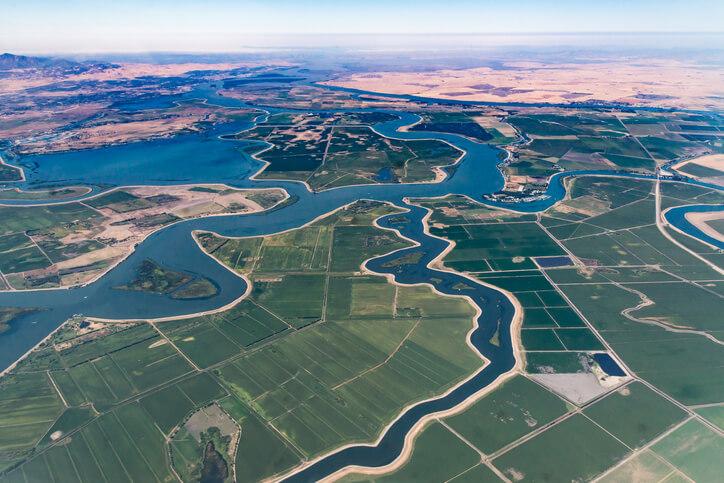Does California Water Law Need To Change To Address Climate Change?
Why California Water Law Is So Important

Nature of Drought in California
A Triumph in Water Law Reforms
In 1978, then-California Governor Pat Brown presented the Governor’s Commission Report, which made important recommendations to reform California water rights law. The 1978 Governor’s Commission Report inspired a recent reform proposal, authored by a group of water law and policy experts, including Professor Harder. The final report of these experts, “Updating California Water Law to Address Drought and Climate Change,” was issued on February 3rd, 2022. The report proposed reforms in the following three key policy areas:
- Implementing the human right to water
- Adjusting the tools available to the State Water Resources Control Board
- Address the extinction crisis in California native fisheries
Specific recommendations relate to ensuring that those who are dependent on groundwater for drinking water are not impacted by agricultural groundwater pumping; providing the state with the tools needed to ensure that water rights are lawfully exercised; providing for “real-time” data regarding use of water statewide; and ensuring that dams are operated to protect water quality for fish. The group did not suggest that their recommended reforms would provide all necessary fixes to state law; the group advocates for and supports others that seek to reform California’s water laws recommendations.
The report was incorporated into legislation and considered for regulatory implementation as Senate Bill 389, which was signed by Governor Newsom on October 8, 2023. If you would like too learn more about the details of the proposed recommendations, please watch the webinar.
Professor Jennifer Harder was integral in helping to write the bill, testified on the bill, and otherwise engaged with the legislative process. SB 389 provides clear authority for the state of California’s water agency to investigate the validity of all surface water rights and to bring enforcement actions where warranted. Prior to this bill, the Board did not have clear authority over certain common law rights to water called “pre-1914” and “riparian” rights. This bill is a real-world step in the right direction, and McGeorge School of Law is proud of contributing to a better climate future.
McGeorge would also like to note that SB 389 was the brainchild of former Deputy AG Cliff Lee, who passed away in 2022, and with whom Professor Harder worked closely to develop and support the bill. The reform effort was initiated by Jonas Minton of the Planning & Conservation League, who also passed in 2022. SB 389 is a testament to their memories.
The MSL Program’s Unique Environmental Courses
If you are inspired and interested in becoming part of the change, your next step is right here. The MSL degree is a part-time, fully online, 26-unit degree program with asynchronous lectures. Students interact with their professors and classmates weekly through discussion boards throughout the program and have opportunities to work on projects with classmates and meet with professors virtually in flexible office hours. Typically, the coursework is spread over two years. However, arrangements for a more flexible schedule can be made with the Assistant Dean for Graduate and Online Programs.
McGeorge’s Master of Science in Law online program has two concentrations – Government Law and Policy and Water and Environmental Law. These two concentrations are closely connected and complement each other. The MSL program is for those who want to have practical knowledge of law and policy but do not want to be lawyers.
The Water and Environmental Law program offers unique courses that focus on the legal aspects of environmental issues. For example, water and environmental law is heavily connected to the work of public agencies at the local, state and federal levels; McGeorge’s curriculum includes courses such as The Executive Branch and the Administrative State, and Leadership in Organizations, which provide students with practical skills needed to work with agencies. Some of these skills include lessons in how to write, interpret, and comment on policies and regulations, expert insights into agency process, and practical strategies for working with agencies.
Other courses:
- Water Resources Law, taught by Professor Harder, gives students a practical understanding of water use and the social policies that govern water management.
- Environmental Law is a survey course that covers the Endangered Species Act, the National Environmental Policy Act, the Clean Water Act, the Clean Air Act, and laws in other areas such as, for example, hazardous waste and climate change.
- Water and Environmental Justice focuses on water rights in disadvantaged communities, federal and tribal rights, the human right to water, and the public trust doctrine. The course looks at water allocation through a critical race lens and investigates the legal and institutional frameworks for water supply as well as the deeply related issue of land use, with a particular focus on drinking water.
McGeorge also offers the LLM in Water & Environmental Law. The LLM program is for attorneys, recent law school graduates, or foreign-educated legal professionals to develop depth of knowledge in a specialized area of environmental, water resources, regulatory compliance, and public agency law.
Students build marketable expertise with the guidance of expert faculty chosen for outstanding teaching as well as the depth of knowledge in government law, water resources, or environmental law. Courses emphasize real-world knowledge and the development of practical skills. The programs are convenient and are specifically designed for working professionals or students who need flexibility due to career, family, or other obligations, and who want to further their education and advance their career.
Does California Water Law Need To Change To Address Climate Change? Read More »
